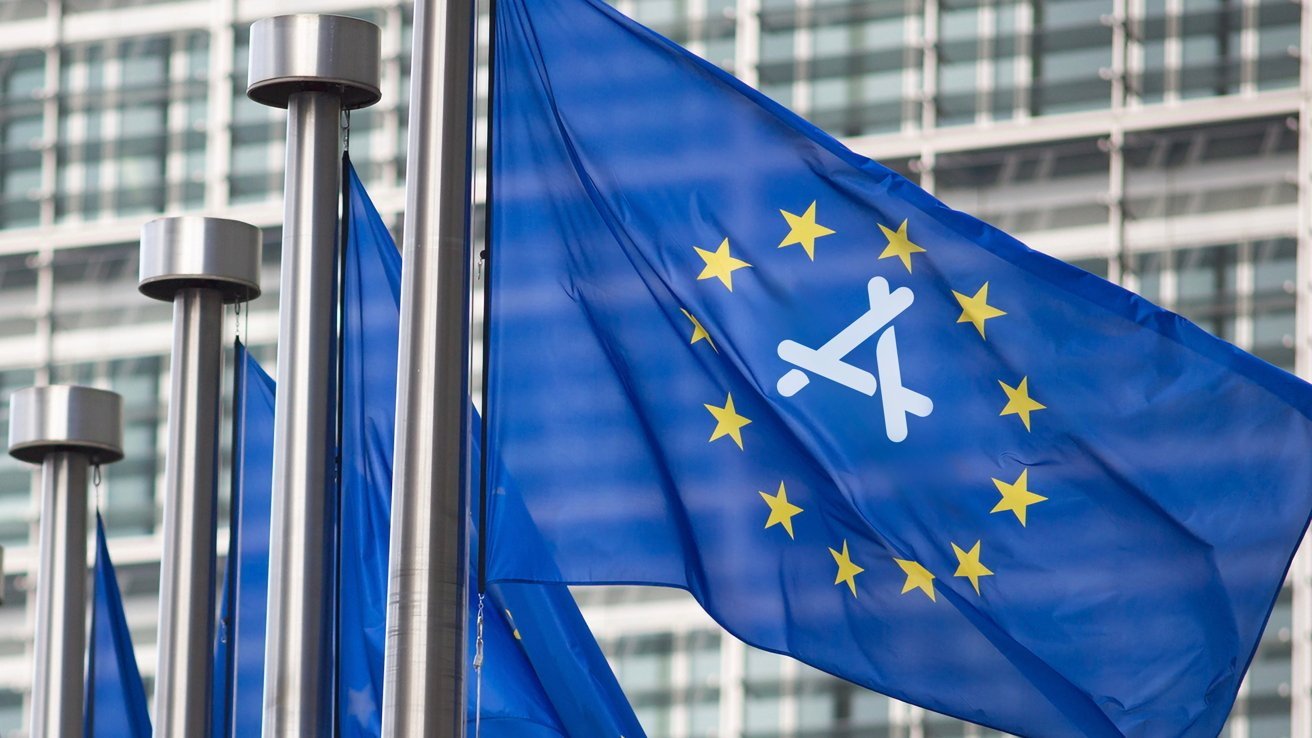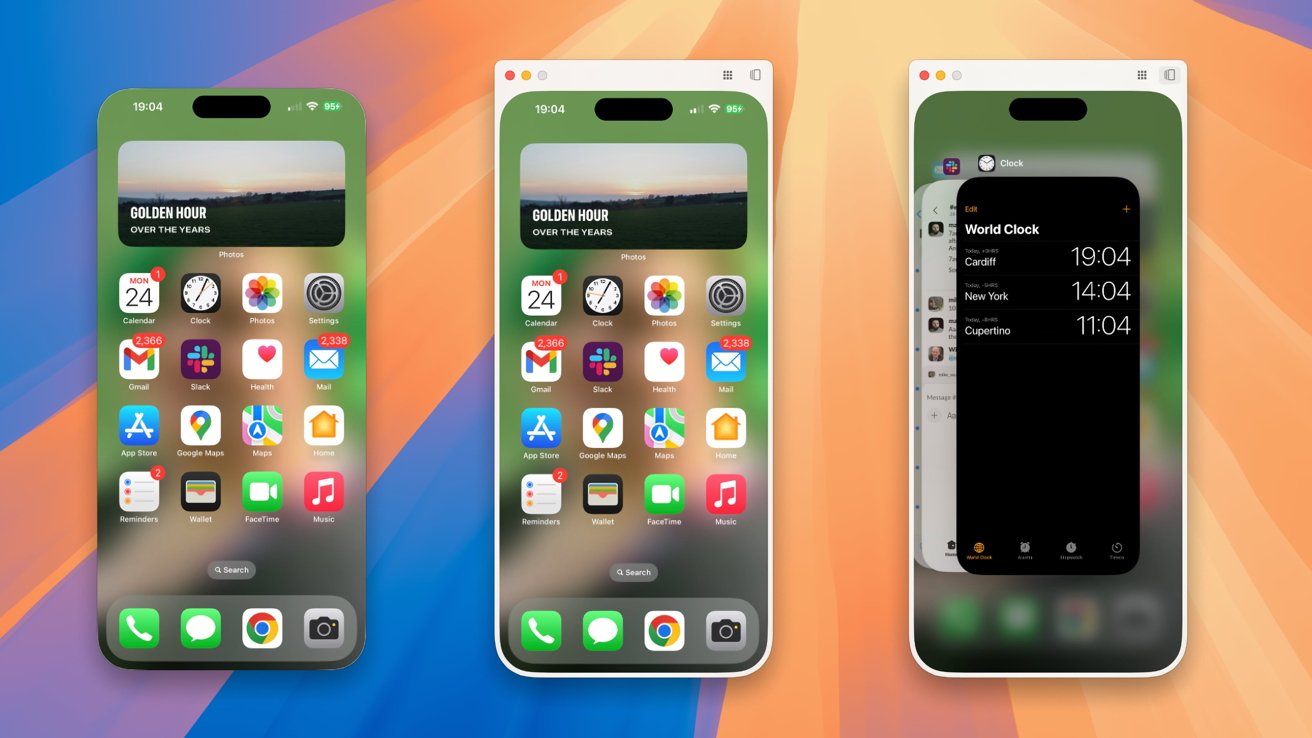Apple tells EU to forget about getting all the new iOS 26 features
The EU's DMA is said to be in the interests of consumers, but as its been implemented, it's just denying them iOS 26 features Apple can't risk giving away to rivals.

An EU flag with the App Store logo
EU Mac users still haven't got iPhone mirroring, and they aren't going to get Live Activities on the Mac, either. Now Apple has directly told the EU regulators that there are more iOS 26 features that its users at least won't see remotely as soon as anyone, anywhere else.
The only one named is Visited Places, but according to the Wall Street Journal, Apple's vice president of Apple Legal, Kyle Andeer, has used a new EU workshop to tell officials that there will be more.
"We've already had to make the decision to delay the release of products and features, we announced this month for our EU customers," he said. He has explicitly also told them that changes they have already forced on Apple "create real privacy, security [and] safety risks to our users."
He would say that, of course, as that has been Apple's party line throughout the course of the Digital Markets Act. But despite the EU designating several companies as gatekeepers who must be regulated, only Apple is being required to give away its technologies to rivals.
Amongst many other firms, Apple's go-to example of the problems it claims are being caused, is Facebook owner, Meta. According to Apple, Meta has rolled up its sleeves and dug in deep to exploit the DMA's requirements, and is asking for technology and data access it has no call to.
Possibly the EU thinks Facebook has turned a leaf since its Cambridge Analytica scandal, or that its security is more robust since 2024 when it was revealed to have stored 600 million Facebook and Instagram passwords in plain text. If so, the regulators need to look at this week's privacy debacle as Meta attempts to get everyone's entire photo library forever, for free.
If the EU thinks that no firm is more trustworthy than any other, that's not an unfair point. Apple is a corporation, not a saintly monastery, but it has staked its business on user privacy and security.

If you're in the EU, you can't use iPhone Mirroring
Should an Apple user lose any data or be subjected to any privacy violation, Apple gets its face smashed into hot coals. When Facebook does it, it's a weekday.
Yet seemingly the EU does not see this. The only known response so far to Andeer's comment is that an official says Apple and the EU disagree. This helps no one, and doesn't promise much chance of change in the near future.
DMA needs clarity, not just fines
From Apple's perspective, and in actual execution, the Digital Markets Act may require it to give away its technology that it ships in Europe for free, to anyone who asks for it. The DMA may also mean that Apple must support the devices and the services of anyone who asks for it.
So where Microsoft, Google parent company Alphabet, and Amazon, can develop whatever technology they want and keep it, Apple may not. Apple might have to develop Android Mirroring.
Or it might not.
This is an area where it ought to be clear, but it isn't because the foundation of the DMA is demonstrably not created for the EU's consumer population as it is repeatedly claimed. It demonstrably favors companies instead -- either because they are European, such as Spotify -- or because the only firms able to benefit from the law are large corporations.
An open system that has one open company and half a dozen entirely closed firms, is not an open system at all, and it does not benefit consumers.
Apple ought to be able to just ask whether, say, providing iPhone mirroring will mean having to develop Android mirroring. The EU ought to be able to just say yes or no.
And this questioning and answering ought to have been happening for years now. Initially, both Apple and the EU repeatedly said that they were in discussions about how the company could comply, but then Apple gave up and said actually, no, not so much.

It's a small but useful new feature in macOS Tahoe, but EU users will not get iPhone Live Activities on Mac
Apple said that in its appeal against the EU fining it $570 million for alleged non-compliance with the DMA. Apple claims that it proposed a solution that would fully comply with the DMA, but the EU told it to wait -- and then fined it afor not implementing that solution.
The EU, for its part, shrugs about that. The fine is based on what Apple did, not whatever idea it may have had about doing something else.
What happens next
We'll never know if Apple really did sit on whatever its solution was, but whether it was then or since Apple appealed, there has been a breakdown in communication. Given how inept previous conversation appears to have been, this might not make a statistical difference.
But there is one sign of one hope that someone at the EU might sort this out and genuinely benefit consumers in its territory. It's that Andeer said all of this to their faces in a workshop in Brussels.
Called the "2025 Apple DMA compliance workshop," it was a chiefly in-person meeting on June 30, 2025. It's part of a series of such workshops, one per company such as Apple and Amazon, running from June 20 to July 3.
Maybe seeing Apple representatives throwing up their hands might make EU representatives have a think.
Yet you know what will happen. While the meeting is private, Apple presumably raised its go-to Meta example, and the EU probably said they will ask Meta about it.
The "2025 Meta DMA compliance workshop" is the last one, on July 3. And in it, Meta will surely say no, no, we need access to all user passwords, photos and data in order for our Meta headset to work.
And then at some point, the EU will nod, agree, and issue another comment about Apple making a "stunning, open declaration" against providing features for European users.
The European Union was the first region in the world to introduce this kind of Big Tech regulation, and it should be applauded for doing so. But we've gone beyond the point where its claim of being for consumer good is a misunderstanding.
It's now just a lie. Consumer rights are just a flag waving exercise as the DMA helps big business, most particularly big European businesses, and has to -- has to -- result in EU users getting a bad deal.
Read on AppleInsider

Comments
It is a shame, as some of the EU regulations have been decent - like the USB-C support.
For years, Apple systems have proposed services later than in the US. An example? The Vision Pro sold in the EU has no Apple Intelligence. Why? Nobody knows. We have Apple Intelligence in the EU from April on all other devices. Local Siri replies on devices have run there years later than in the EU, and it was way before DMA.
Of course there are numerous reasons why that would be a bad idea. Shareholders would panic and scream. Apple would probably lose markets share, some of which it would never get back. A bad idea, but I'd like to see Apple to it, or at least hold off on shipping got dix months.
Also, don't think that not being in the EU prevents similar sentiment being expressed in legislation in the UK. Last week, the CMA published their timetable to investigate whether or not to designate Apple as "having strategic market status (SMS)", which they're entitled to do under the DMCC Act 2024; that's basically the UK's answer to the DMA.
So you would support the US designating European products for targeted legislation? Maybe BMW and Volkswagen have strategic market status in the USA? What is good for the goose is good for the gander.
The requirement was due to fragmentation in charging options (and goes far beyond phones BTW).
Linux doesn't even come anywhere close to macOS and there is no EU version of anything that competes with Android let alone iOS.
Maybe the EU should concentrate on solving this before raking Apple over the coals for making products that no one competes with. Through no fault of Apple's I might add.